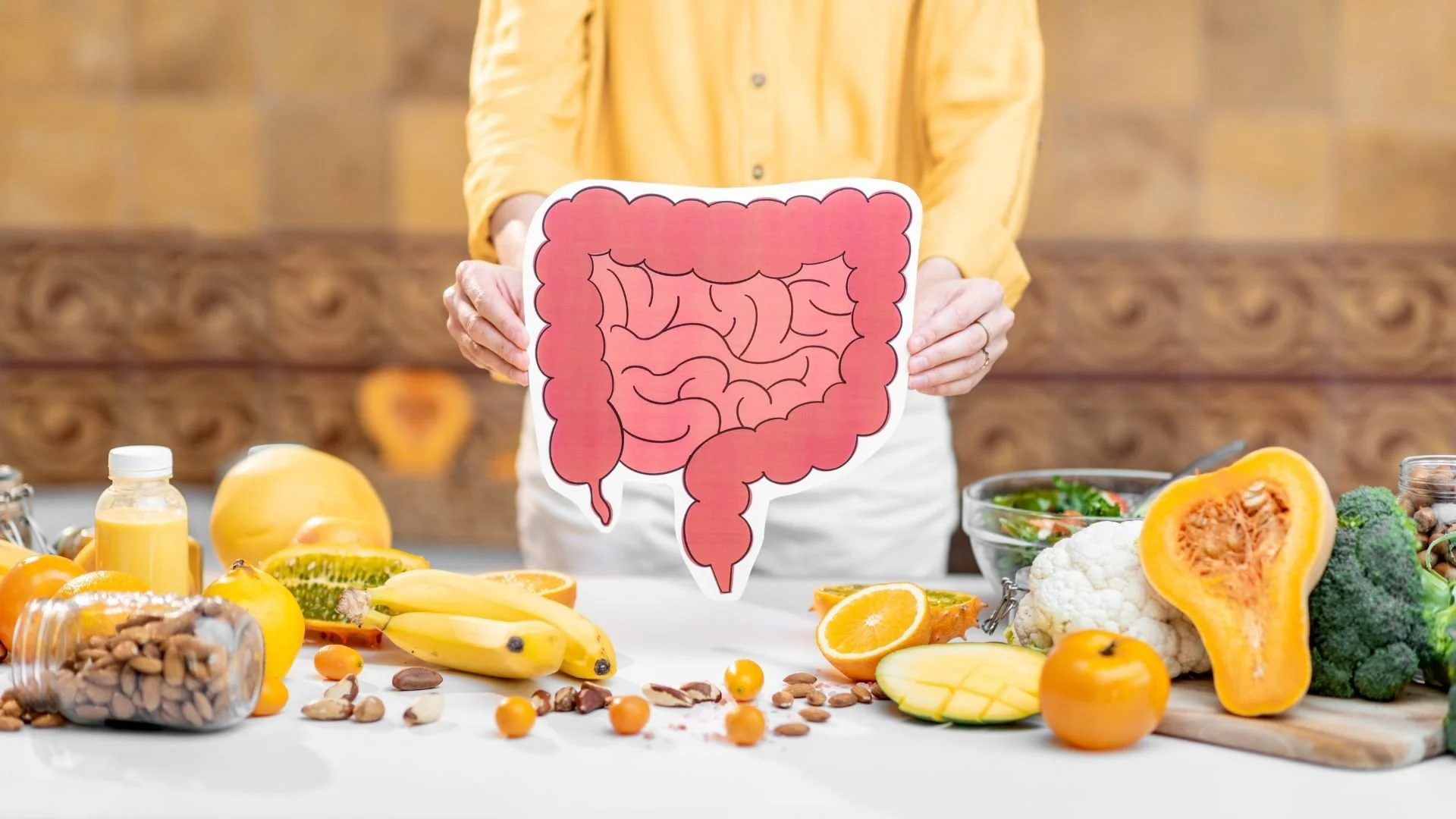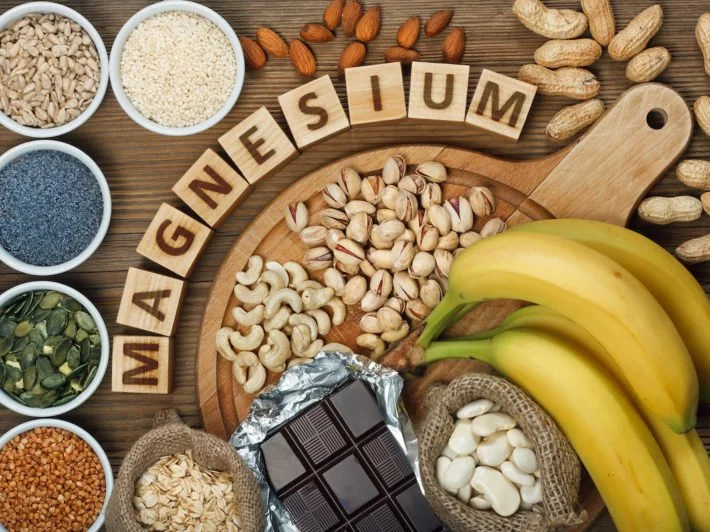For many people, the idea of weight management immediately brings to mind restrictive diets, endless calorie counting, or punishing exercise regimens. Yet, as most have discovered, these approaches rarely produce lasting change. They often leave people frustrated, fatigued, and no closer to the vitality and balance they’re seeking. A more effective path begins with a simple shift: moving away from “losing weight” as a short-term goal and toward managing health and metabolism as an ongoing practice.
Read MoreOur gut and hormones are in constant conversation. While we often separate digestion from hormonal health and mood, science—and everyday experience—shows they’re deeply intertwined. The gut isn’t just where we digest food; it’s a central hub for making neurotransmitters, regulating inflammation, and even processing hormones like estrogen and cortisol. When the gut is out of balance, hormonal imbalances and mood issues often follow.
Read MoreThe Healthy Eating Pyramid, developed by the Harvard School of Public Health, is a nutritional guide that provides a visual representation of the types and quantities of foods that should form the foundation of a healthy diet. This pyramid differs from earlier food pyramids by emphasizing quality and variety in the diet, and it aligns with the principles of natural medicine, which advocates for nutrition as a cornerstone of overall health and well-being. In this article, we will explore the structure of the Healthy Eating Pyramid, its key components, and how it supports a holistic approach to nutrition and health.
Read MoreAs winter blankets the world in a chilly embrace, our dietary needs and cravings often shift to warmer, heartier fare. While it may be tempting to indulge in comfort foods laden with calories, there's a bounty of healthy, natural winter foods that can nourish our bodies and boost our immune systems during the colder months. In this article, we'll explore a variety of seasonal fruits, vegetables, and other winter staples that not only add a burst of flavor to our meals but also provide essential nutrients to keep us in optimal health.
Read MoreThe vivid and enticing colors in our food can be a feast for the eyes, but behind the scenes, they often rely on a range of artificial additives, including food dyes. Red Dye #3, also known as Erythrosine, is one such synthetic food dye, which has been a subject of controversy and concern for years. In this article, we will delve into the world of Red Dye #3 and explore the potential risks associated with its consumption.
Read MoreA mother’s milk provides antibodies which protect the baby from many common respiratory and intestinal diseases, and also contains living immune cells. First milk, Colostrum, is packed with components which increase immunity and protect the newborn’s intestines. Artificially fed babies have higher rates of middle ear infections, pneumonia, and cases of gastroenteritis (stomach flu). Breastfeeding as an infant also provides protection from developing immune system cancers such as lymphoma, bowel diseases such as Crohn’s disease and celiac sprue, and juvenile rheumatoid arthritis, all of which are related to immune system function. Breastfed babies generally mount a more effective response to childhood immunizations. In all these cases, benefits begin immediately, and improve with increased duration of breastfeeding.
Read MoreGenetically Modified Organisms (GMOs) have been a subject of extensive research and debate over the past few decades. While they offer potential benefits such as increased crop yields and improved nutritional content, concerns have been raised about their potential health risks. This article aims to provide an in-depth analysis of the health risks associated with GMO foods, focusing on various aspects including allergenicity, toxicity, antibiotic resistance, and unintended effects on human health. By examining the available scientific literature and contrasting different viewpoints, this article offers a comprehensive overview of the current understanding of GMO-related health risks.
Read MoreFiber might just be the key to healthy weight management – and nature packages it in perfectly balanced ratios with carbs when you eat them as whole foods. Think unprocessed fruits, vegetables, whole grains, beans, nuts and seeds. Research suggests that carbohydrates are meant to come packaged in nature-balanced ratios of total carbohydrates to fiber. In fact, certain types of fiber affect how completely your body absorbs carbohydrates and tells your cells how to process them once they are absorbed.
Read MoreMore evidence of the likely neuroprotective effect of magnesium was recently published in the European Journal of Nutrition. This study comes on the heels of an analysis of NHANES data published last year in Alzheimer’s & Dementia which found that a higher total intake (diet and supplemental) of magnesium was associated with better cognitive function among participants aged 60 and older.
Read MoreA recent study has found that the consumption of watermelon may positively impact hepatic gene expression and upregulate lipid metabolism in obese mice. The current Western diet, often characterized by intake of high levels of saturated fats, cholesterol, and refined carbohydrate, has been shown to contribute to the development of non-alcoholic fatty liver disease (NAFLD) and non-alcoholic steatohepatitis (NASH), both associated with excessive fat accumulation in the liver.
Read MoreVitamins and minerals are essential nutrients because they perform hundreds of roles in the body. There is a fine line between getting enough of these nutrients (which is healthy) and getting too much (which can end up harming you). Eating a healthy diet remains the best way to get sufficient amounts of the vitamins and minerals you need.
Read MoreAccording to a review in the journal, Amino Acids, collagen peptide supplementation (COL) in conjunction with exercise, has been shown to help support healthy joint functionality for people with degenerative bone and joint problems. Collagen peptides are a critical element of extracellular connective tissue, making up one-third of the total proteins in the human body. COL, alongside exercise, can have some stimulatory effects on the extracellular matrix of connective tissues, improving their structure and load-bearing capabilities.
Read MoreWhen you feel depressed, there are many things you can do to fight it. For instance, the food you eat directly impacts your psychological well-being. Thus, one of the most helpful steps you can take is to amend your diet to get adequate amounts of all nutrients that prevent poor mental health. If you feel the tell-tale signs of depression rearing their ugly heads, make sure you eat these twelve foods often.
Read MoreNo matter what you call Moringa oleifera — also known as “drumstick tree,” “tree of life,” and “miracle tree” — it's one of the most nutritious plants in the world. It has a wide range of nutritional and bioactive compounds, including essential amino acids, carbohydrates, fiber, vitamins, minerals and phytonutrients, making this plant a powerful one.
Read MoreMagnesium is the 4th most abundant mineral in the human body following calcium, sodium, and potassium. Intracellularly, magnesium is the 2nd most abundant cation behind only potassium. The number of essential roles magnesium plays in the body is extraordinary, with over 300 enzymes requiring magnesium as a co-factor for proper functioning. Unfortunately, magnesium is one of the most prevalent nutrient gaps in the US.
Read MoreLike vegetables, fruits should be an essential part of your diet. After all, the seed-bearing foods contain important vitamins, nutrients, and fiber that contribute to your overall health. But some fruits are better for you than others, as findings from University of California, Los Angeles study suggest that grapes are especially helpful when it comes to lowering cholesterol and that consuming them may reduce your risk of having a heart attack.
Read MoreDiet has a huge impact on disease risk in general. As many as 30 percent of all cancers are linked to poor dietary habits, Specific foods have been shown to do everything from keeping your gut microbiome diverse to helping you ward off the occasional upper-respiratory infection — especially important during cold and flu season.
Read MoreThis article will walk you through the basics of functional nutrition and how it has the potential to change your health forever! Most of us know what it’s like to be stuck in a dieting cycle that never seems to end. Maybe the goal is to lose weight, or have more energy, or even to reduce gastrointestinal issues. Whatever your reason, the constant adjusting and readjusting of one’s diet can be exhausting. Functional nutrition represents a way to end the dieting cycle and start eating for health and wellbeing.
Read MoreA strong immune system helps to keep a person healthy. Can specific foods boost the immune system? When the immune system comes into contact with a pathogen, it triggers an immune response. The immune system releases antibodies, which attach to antigens on the pathogens and kill them. Incorporating specific foods into the diet may strengthen a person’s immune response.
Read MoreAlso known as beetroot, garden beet, or red beets, beets are low in sodium and fat and offer 37 calories per 1/2 cup. In addition, beets contain nutrients that promote good health. To enjoy these brightly colored vegetables, incorporate them into salads and soups or use them on sandwiches. You can also add beets to your favorite foods to make them more nutritious and fun.
Read More



















